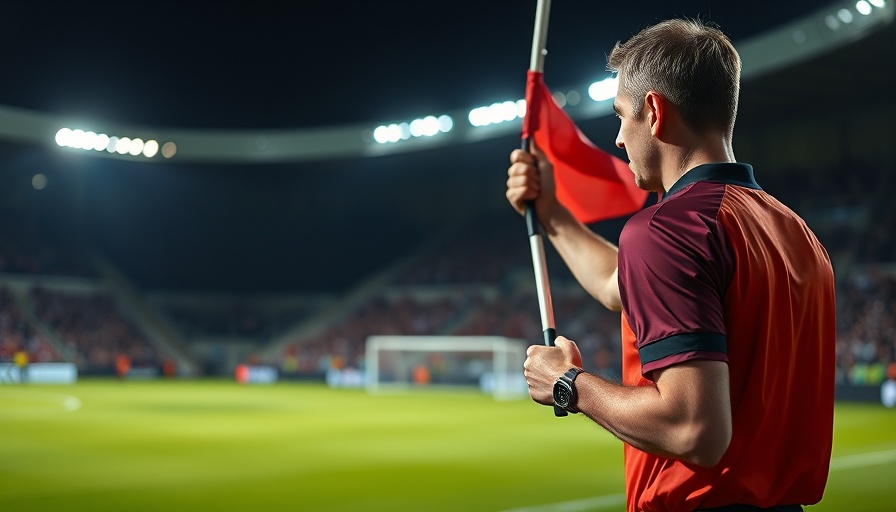
Understanding the Controversial Call: Why Was the Penalty Disallowed?
In a highly contested Nedbank Cup match between TS Galaxy and Durban City, a critical moment arose when TS Galaxy players believed they had a penalty awarded after a foul inside the box. Following the incident, former FIFA referee Ace Ncobo clarified why the penalty was ultimately disallowed, offering insights that could reshape how fans and players perceive officiating in South African football.
A Clear Breakdown: Ace Ncobo's Explanation
Ace Ncobo, known for his expertise and fairness, dissected the contentious foul that took place on February 14, 2025. He explained that the assistant referee, Romeo Matibidi, played a pivotal role in decision-making. According to Ncobo, initial thoughts suggested a foul towards TS Galaxy's Samir Nurković was deserving of a penalty; however, after consulting with Matibidi, the conclusion was that the contact did not constitute a clear penalty.
“The assistant referee communicates with the main referee while keeping in mind the context of the game, including both players' actions leading to the tackle. There are multiple factors that referees have to assess during these critical moments,” Ncobo detailed, underscoring the challenges officials face in high-stakes environments.
The Challenges of Refereeing in the Premier Soccer League
Refereeing in the Premier Soccer League (PSL) is fraught with scrutiny, and incidents like this one highlight the intense pressure officials are under. With high emotions from players and fans alike, any call can lead to uproar, as seen with TS Galaxy coach Sead Ramovic's reaction. Ramovic argued that it was a clear penalty, emphasizing the need for consistency in officiating.
Moreover, the debate around introducing Video Assistant Referee (VAR) technology intensifies, especially after incidents like this further fuel the community’s frustrations about officiating. Ncobo himself suggested that the introduction of VAR could indeed help reduce the confusion surrounding such decisions, pointing out that a second look might confirm or overturn the on-field call, allowing for a level of clarity currently lacking.
The Societal Impact of Sports Decisions
Decisions on the field extend beyond merely sporting outcomes; they often resonate through communities. Fans of Bafana Bafana, the men's national soccer team, and other major South African teams like Mamelodi Sundowns or Kaizer Chiefs, feel these rulings significantly. The emotional investment fans, players, and coaches exhibit can shape community pride and sportsmanship.
In broader contexts, how these penalties are treated can influence young aspiring athletes. If they perceive that officiating is fair and transparent, it builds a trust in the game, which is crucial for developing sports culture in South Africa.
The Future of Refereeing in South Africa
As we look towards the future of football officiating in events such as the Rugby World Cup or the Cricket World Cup, there is a call for systemic changes in how games are policed. The scrutiny surrounding calls like the one made at the Nedbank Cup is not isolated but part of a broader conversation about the evolution of officiating standards across all sports in South Africa.
Furthermore, as major tournaments approach, including the upcoming AFCON and WAFCON, stakeholders might push for intensified training for referees, ensuring they are equipped to handle the game's emotional stakes while keeping the integrity intact.
Engagement Through Discourse
In a sport where decisions often spark lively discussions, Ace Ncobo’s clarification serves not just as a postmortem on a single match but as a catalyst for broader engagement within the sports community. Fans, athletes, coaches, and even officials can unite under the aim of understanding the complexities of officiating.
As athletes ourselves, let’s rally behind a more informed perspective on the referee's role in pivotal game situations. Whether you're a rugby enthusiast, a cricket fan, or a follower of soccer, consider how you might help foster a more supportive atmosphere around officiating in sports.
It’s vital for every sports lover to stay informed about refereeing practices and advocate for improvements that benefit the game. Let’s collectively invest in the integrity of sports in South Africa.
 Add Row
Add Row  Add
Add 




Write A Comment